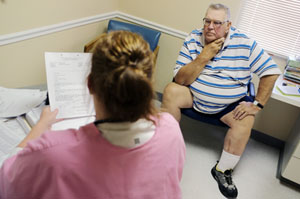Dr. Angela Patterson often sees her patients when she eats lunch at Mel’s Diner, an oasis in Puxico, a farming town in Stoddard County in southeast Missouri.

Dr. Angela Patterson talks with patient Jack Miller at Puxico Medical Clinic (Photo by Erik M. Lunsford/St. Louis Post-Dispatch).
Patterson runs a family clinic in Puxico, population 861, where a small staff of physicians and nurses tend to patients who might otherwise not receive care. Their busy offices, located in the rear of a bank building, are cluttered with medical files, a refrigerator for lab tests, an X-ray machine, and supplies.
“I’ve been to patients’ homes. I’ve been to their Little League games. I know who’s getting married and divorced,” said Patterson, a specialist in internal medicine, who grew up in the nearby town of Fisk in Butler County. Her father farmed; her mother taught school.
“We have people here who financially and physically can’t get to Poplar Bluff,” she said, adding that a round-trip drive takes an hour out of your day.
Poplar Bluff Regional Medical Center operates seven family clinics in four rural counties to fill the gap for rural patients, many of whom are elderly and afflicted with multiple chronic conditions such as obesity, diabetes and heart failure. Nearly 60 percent of the clinic’s patients are on Medicare, and some are on Medicaid as well.
“I struggle with being overweight, so I talk with patients about exercise and making changes,” said Patterson, who sees on average 25 patients a day. The clinic’s two nurse practitioners, Kimberly Te and Holly Reed, see additional patients; some need urgent care. Reed also makes rounds in a nearby nursing home and residential care facility.
“I never wanted to be a doctor who just hands a patient a scrip,” Patterson said. “People have to wait. I never operate on time. But when they see me, we may talk for an hour. … I do a lot more mental health care than I thought I would.”
The physician tries to talk with smokers once or twice a year. “To be honest, I don’t badger them every single time,” she said. “People have the right to make poor choices. But I do try to counsel them.”
She nudges her most senior patients toward hospice care, rather than additional diagnostic tests and hospitalization toward the end of life — encouraging them to value the quality, rather than quantity, of their days.
“We’re doing pretty well here, but nothing’s perfect,” said Patterson, indicating that she’d like to hire dieticians but Medicare won’t pay for them.
Story Components
- Hospital In Rural Missouri Faces Tough Challenges
- Small-Town Clinic Provides Care To A Farming Community’s Poor
Patterson also treats kids, from age 2 and up. About 46 percent of the children in Stoddard County are covered by Medicaid.
Dr. Bijan Bastaninejad, a pediatric hospitalist, spends five days a month at the clinic — handling children’s appointments and walk-ins. Some of these kids, too, are obese and diabetic. “It’s hard to make lifestyle choices, especially if your (family’s) financials are not in place and it’s easier to buy fast food,” he said.
Te, the nurse practitioner, summed up the dilemmas of treating the rural poor. “They’re not ignorant people, but they’re not educated,” she said. “You need to explain how smoking complicates the disease process.”
Te said that many patients cannot afford to buy medicine . “Older people on fixed incomes can’t afford a $25 a month co-pay for a drug when they’re taking eight or 10 pills,” she said.
Ginger Holloway, the clinic’s office manager, said that she often spends 30 or 40 minutes on the phone trying to obtain an insurer’s “pre-authorization” for treatment.
“Insurance pays less and less all the time,” she said. “We have some really sick people who still make too much money to get (government) assistance.”






